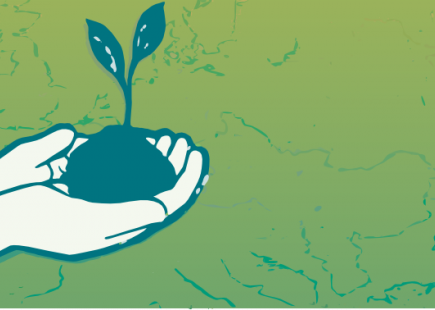Europe’s young and aspiring farmers will face increasing barriers to entry as land is rapidly concentrated in relatively few big farms. Land is even more unevenly distributed than wealth. A steep decline in Europe’s small farms is underway with damaging consequences for food security, employment, and development. Read the report » See the infographics »
This new report shows how the 'rights-based approach' to fisheries governance is in fact a mechanism for depriving indigenous and subsistence fisherfolk of their traditional waters and transferring them to corporations and economic elites. It must be replaced with a 'human rights approach. Read more »
The water crisis in Lagos is dire. The World Bank’s decades-long push for water privatization has left the city with dry taps and many people drinking unsafe water or paying exorbitant amounts for water of unknown quality. This report lays out a vision for how the city can solve its water crisis. Read more »
The Regional Comprehensive Economic Partnership (RCEP) could grant corporations the exclusive right to bypass domestic legal systems and sue governments at international tribunals. This report exposes a growing wave of corporate lawsuits against Asian countries, which could lead to a drain in public budgets of millions of US dollars and undermine governments’ rights to regulate in the public interest. Read the report »
Trump's obsession with security is not an anomaly, but a reflection of a growing tide of fear-based politics that has also shaped the climate change debate. In an interview about TNI's book, The Secure and the Dispossessed, Nick Buxton reflects on the 'securitisation' of climate change and the need to advocate a just transition. Read the article »
'Cooling the planet: Frontline communities lead the struggle' brings together stories from community leaders on the frontlines of climate change. Six stories expose the impacts of false corporate solutions to the climate crisis and six stories present real alternatives that can help protect our planetary home. Read the article »
Why did the November Congress of the first Cities for Public Water, held in Madrid, mark a milestone for the public water movement? Read the article »
Developing real solutions to climate and energy challenges will require imagination, determination and inspiration. Inspiration may come from the many cities, communities and even countries that are working hard to make the energy sector democratic, equitable and based on renewable sources. Read the article »
Ewald Engelen poses that citizens have increasingly been socialised to think of themselves as financialised subjects. With finance penetrating all spheres of social life, it has infused those fears of social life with concerns that are predominantly financial. When we think about finance and financialisation as something that is multi-layered we can transform these layers into potential sites of resistance. Read the article »
Although The UN General Assembly Special Session (UNGASS) on drugs was characterised by disappointments, it was nonetheless a critical moment for global drug policy reform, with some progress on several key issues such as human rights, development, gender, proportionate sentencing, access to controlled medicines and alternatives to punishment. This paper outlines some of the key issues to build on before the next opportunity for progress in 2019. Read the article »
The European Union’s approach to bioenergy is shaped by contradictory policies. Climate concerns are highlighted in public discourse and assure broad public support for renewable energy, including bioenergy. Meanwhile, however, the EU’s corporate growth and trade agenda promotes the use of energy that actually increases the EU’s footprint on land elsewhere, with significant implications for environmental and social justice. Read the article »
455 European and Canadian civil society groups issue a joint call to reject CETA, describing the trade deal as a backward-looking and even more intrusive version of the old free trade agenda designed by and for the world’s largest multinationals. We need a paradigm shift toward a transparent and inclusive trade policy founded on the needs of people and our planet. Read the article »
The European Commission has buried a 3 million euro research project that analysed 5000 firms and concluded that it could not find any clear evidence of positive impacts of corporate social responsibility on Europe’s economy or society. Read the article »
Instead of jobs and relief, the Obama administration offered only half-measures to struggling people in the Rust Belt and beyond. Trump had a message: The economic recovery was a mirage, people were hurt by the Democrats’ policies, and they had more pain to look forward to should the Democrats retain control of the White House. The problem for Clinton was that the opportunistic message of this demagogue rang true to the middle class and working class voters in these states, even if the messenger himself was quite flawed. Read the article »
60 organisations, including TNI, express concerns at the COP 222 climate negotiations that treating soils as carbon sinks has the danger of facilitating further land grabs and expanding an industrial agricultural model that is the cause of the climate crisis. Read the article »
En español
La batalla de Seattle marcó un cambio de rumbo para los sistemas de conocimiento. Sin embargo, a pesar de la profunda crisis del neoliberalismo, el capital financiero ha conseguido mantener un enorme poder, al que solo se puede hacer frente con una nueva visión integral de una sociedad deseable. Leer más »
Alrededor del mundo, la ciudadanía está recuperando el control sobre el sector de la energía, combatiendo la ley del mercado y reinventando nuevas formas de producir, distribuir y usar la energía. ¿Cómo podría el concepto de democracia energética contribuir a hacer realidad sistemas de energía socialmente justos, con acceso universal, tarifas asequibles y puestos de trabajo dignos, con derechos sindicales y bien remunerados? Leer más »
El primer ‘Encuentro de ciudades por el agua pública’ representa un hito del movimiento y permitirá reforzar la defensa de la gestión pública del agua desde una perspectiva de bien común y derecho humano. Leer más »
¿Qué sucede cuando las comunidades asumen el protagonismo en la lucha contra el cambio climático? He aquí 12 historias que denuncian las soluciones falsas y presentan alternativas reales. Leer más »
Los diez capítulos que componen este libro tienen un elemento en común: la forma en que el Estado se expresa en las sociedades modernas a través de diversos arreglos institucionales tales como las empresas públicas nacionales, municipales, la banca pública o los institutos creados para cumplir con una misión o servicio público central en cada país. Leer más »
El creciente papel del sector privado en la gobernanza mundial está socavando los derechos humanos de los pueblos pescadores. Leer más »
Un grupo de 60 organizaciones, entre las cuales el TNI, expresa su preocupación por que la forma de tratar los suelos en las negociaciones sobre el clima, como sumideros de carbono, podría facilitar el acaparamiento de tierras y la expansión de un modelo agrícola industrial que impulsa la crisis climática. Leer más »


